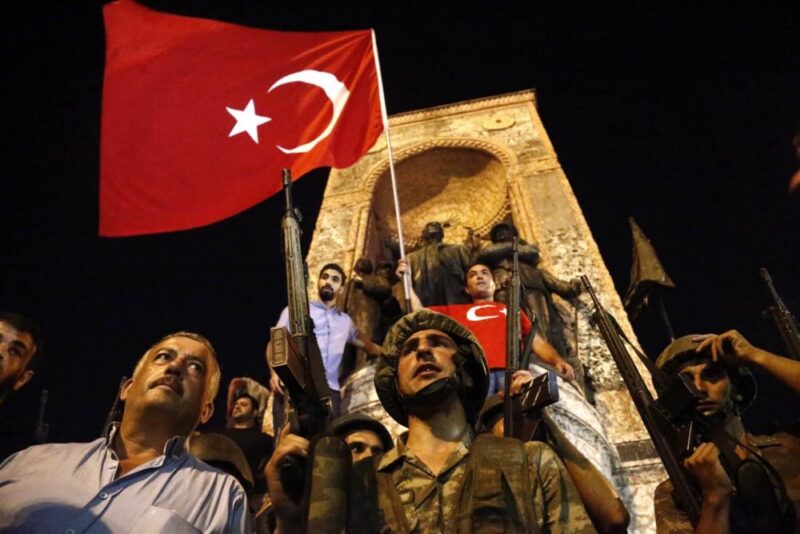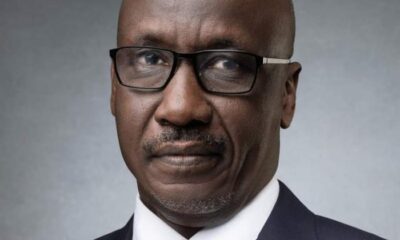Global Issues
The power struggle that led to Turkey’s coup attempt -By Stratfor analysts


Turkey’s Bosporus, the 31-kilometer (19-mile) waterway transecting historic Byzantium — the present-day sprawling metropolis of Istanbul — provides an instructive metaphor for roiling Turkish scandals.
Surface currents on this busiest of world straits flow from north to south, from the Black Sea through the Bosporus and on to the Mediterranean. Unseen, however, a deeper current below runs south to north, against seeming logic actually pulling water from the Mediterranean up and into the Black Sea from which it came. The Black Sea is what geologists call a “meromictic” lake, with some 90% of its volume devoid of oxygen, all of it low in salinity. The Mediterranean, by contrast, is highly saline. The result is a complex hydrology discovered only in 1935. The currents and crosscurrents mystify scientists to this day.
Much the same can be said of Turkey’s politics: What one sees from above obscures the complexity and interplay of currents below. On the surface, Turkey appears to be a modern state with a political system and parties easily analogized to their counterparts in Europe or North America.
Defanging the military
In this view, the ruling Justice and Development Party, or AKP, headed by Prime Minister Recep Tayyip Erdogan is a reformist group credited with defanging a prickly military that mounted three coups between 1960 and 1980, delivering to the country a vibrant democracy. The AKP came to power in 2002 on a trilogy of promises to promote freedom, end poverty and end corruption. Until recently, Turkey under the AKP was touted by many in the West as a model for the Middle East and Islamic world.
More recently by this account, the AKP that came to power as a coalition of Islamists and liberals, is newly at odds with a group known as the Gulen movement, a powerful religious fraternity whose global network of media outlets, schools and commercial enterprises make it a serious player in Turkish politics. It is led in turn by a lay preacher named Fethullah Gulen, self-exiled and living in Pennsylvania.
People have been swept up in waves of arrests and charges, with AKP ministers threatened with corruption indictments. A raid on the president of the largest state-owned bank found $4.5 million in his home. Scenes of the arrest of the son of the minister of interior, the nation’s top cop, rivet Turkish TV watchers.
Prosecutors tied to the Gulen movement, meanwhile, led the drama. That the movement and its allies in the police and judiciary are seen as the animators of the now infamous “Ergenekon” and “Sledgehammer” court cases that silenced many an AKP critic and put hundreds of officers — including the former chief of the army’s general staff — behind bars, serves to cement this view of the obvious current of Turkish politics. That the government’s reaction was to remove the lead prosecutor, an erstwhile AKP hero, puts the capstone on this conventional narrative.
Shifting alliances
But within Turkey’s complex political hydrology, something deeper ensues. For Turkey is not a modern state. Rather, it is the collapsed star of empire. It is the heir to the dynasties and sub-dynasties that wove the Ottoman Empire into a tapestry of shifting alliances among fiefdoms known as “millets.” In turn, the Ottoman Empire itself, which conquered the Byzantine Empire in 1453, did not so much replace its predecessor as subsume and mimic it. No wonder that Turkey’s politics remain, in a word, Byzantine.
It is not excessively simplistic to argue that the fundamental dynamic of the Ottoman Empire was an endless struggle between the center, in Istanbul, and the periphery that reached at the empire’s height from Budapest in the west to the Arabian Sea in the east, sweeping up to encircle the Black Sea in what is today Russia and the Caucasus. Those centrifugal forces eventually tore the empire apart, leading to the establishment of today’s Republic of Turkey in 1923.
Secular republicanism nominally replaced theocratic monarchism, but old habits and reflexes endured.
Capitalism as an alien concept
One enduring tradition was a rent-seeking system of wealth creation at odds with any notion of Weberian capitalism. Innovation and entrepreneurialism was, and is, an almost alien concept. In its place was an intimacy between business and government that made the two often hard to distinguish. State-run enterprises dominated throughout the 20th century as vast private fortunes depended both on government largesse, connections and high tariff walls. The center of power, moved to the new inland capital of Ankara, was supreme, and tight central control under the tutelage of the military was the rule.
Political parties other than the founding Republican People’s Party were not allowed until the late 1940s. When they arrived their hues were, and still are, more akin to fiefdoms or even the millets of old. They function as patronage systems, arbitrating factional disputes and managing the alliances of powerful families and the state.
The first multiparty elections were held in 1950. Those elections, which yielded rule by a party of the periphery and hinterland, the Democrat Party, also signaled a return to the fundamental tension. Its leader, Adnan Menderes, whom Erdogan sees as a mentor, challenged the rule of the center and the patronage networks that both supported and were nurtured by that center. The result was the coup of 1960. Menderes was hanged. His gallows, constructed next to a makeshift military courthouse during his trial, speaks volumes about presumption of innocence in Turkey and hints at the independence of the judiciary even today.
Great family fortunes were allowed to accumulate, with the Eczacibasis, the Kocs, the Sabancis and the Dogans all synonyms today for Turkey’s largest conglomerates. These replaced, and in some cases outright seized, the assets of the former commercial and subservient Ottoman classes, the non-Muslim minorities now largely departed.
Political dramas
Ideological violence, the Cold War and Turkey’s Kurdish separatist impulses were all part and parcel of Turkey’s grand political dramas of the 1960s, 1970s and 1980s. But whenever a government strayed too far from the centralist line, the military stepped in. Coups occurred in 1971 and again in 1980, with the political classes allowed to return only after a punitive breather each time.
Surges between these two poles created other and lesser commercial dynasties as each party upon obtaining power sought to buttress its gains with a new wealthy class of supporters created through access to state bank credits, public tenders and other patronage.
As globalized trade surged and tariffs fell during the 1980s, another new party and government led by the late Turgut Ozal took power. The Motherland Party spawned another round of assertiveness and economic rise in the hinterland. This empowered the so-called Anatolian Tigers, a breed of conservative bourgeoisie whose wealth stemmed from Turkey’s embrace of the trends of globalization in textiles, cement, furniture manufacture and construction. Lesser clashes between the center and periphery ensued, including a “post-modern coup” in 1996, whereby the military quietly forced Turkey’s first Islamist government from power. Once again, the old guard reasserted itself.
Ultimately, however, this newest class cleared the way for Erdogan’s success in 2002. It also was fueling the rise of the Gulenist movement, which drew and draws its power from a similar, if narrower, base.
The first AKP government was a coalition of sorts of Islamists, secular conservatives weary of the state’s fickle economic management, liberals with an eye on the model of the then-surging European Union, and, of course, the Gulenists.
European Union hopes
The economy was improving, and in 2004, Turkey under the AKP began its negotiations to join the European Union. This embrace of the European Union masked many of the center-periphery distinctions, and a flood of portfolio and foreign direct investment greased the traditional cogs of patronage. But this also opened new fissures between the old and new ruling elites, with foreign direct investment in some years exceeding the entire volume of foreign investment into Turkey from the time of the republic’s founding until 2000.
The sheer momentum of the EU embrace and economic growth aided greatly in the assault on military power, and with help from many quarters, the AKP curtailed the ability of the generals and jailed those who resisted. Real crimes were certainly addressed in a series of trials, though the motivations had to do with, once again, the currents below.
But the AKP’s assault on the old guard was not limited to the military. Bastions of old-line commercial power, beginning with the media and telecommunications empire of the Uzan family, were effectively seized and redistributed to AKP allies. The media and energy empire of the Dogan family was hit next with billions of dollars in tax fines when the group stepped out of line in its reporting. More recently, the powerful Koc industrial and retail dynasty was cut down to size with a series of inquiries that followed support for protesters who rallied in the last spring and early fall in Istanbul’s Gezi Park in opposition to Erdogan and the AKP’s rule.
The anti-Erdogan Gulen movement
For its part, the Gulen movement is at odds with the AKP over many things. On the economic front in particular these include a set of proposed education reforms that would close private university prep classes, a moneymaker for the movement in a sector that vastly outstrips the size of the formal budget for national education. And indeed the movement appears the broker in the new anti-AKP coalition forming among the factions. But this is only the obvious political current.
The Gulenists, however, are clearly not alone. Erdogan’s premiership has aroused great enmities among once-loyal liberals, conservatives and critically, the old elite who once thought they could do business with the AKP. With assets in the police, media and judiciary, the Gulen movement is a minor rival, but a useful and public one for the disparate groups now coalescing to cut Erdogan down to size.
The intent will likely be to tame the AKP, not kill it. The emerging electoral punch of the anti-AKP coalition in a presidential election next summer is unlikely to derail the AKP’s formidable machine. Nor is it likely to deny Erdogan’s move from premiership to presidency. But local elections in March are another matter. The prize of the Istanbul mayoralty, the post from which Erdogan launched his career two decades ago, is one the emerging anti-Erdogan coalition could snag with the help of the Gulenists. That will not devastate the AKP, but it will be a huge psychological blow and slow the party’s swagger.
It will also signal the return of normalcy in Byzantium. After a decade in the shadows and on the defensive, the power brokers of the Ottoman-derived center are back to challenge the upstarts from the periphery of Turkish politics. Turkish politics flow in odd ways and multiple directions, just like the waters of the country’s Bosporus.

















